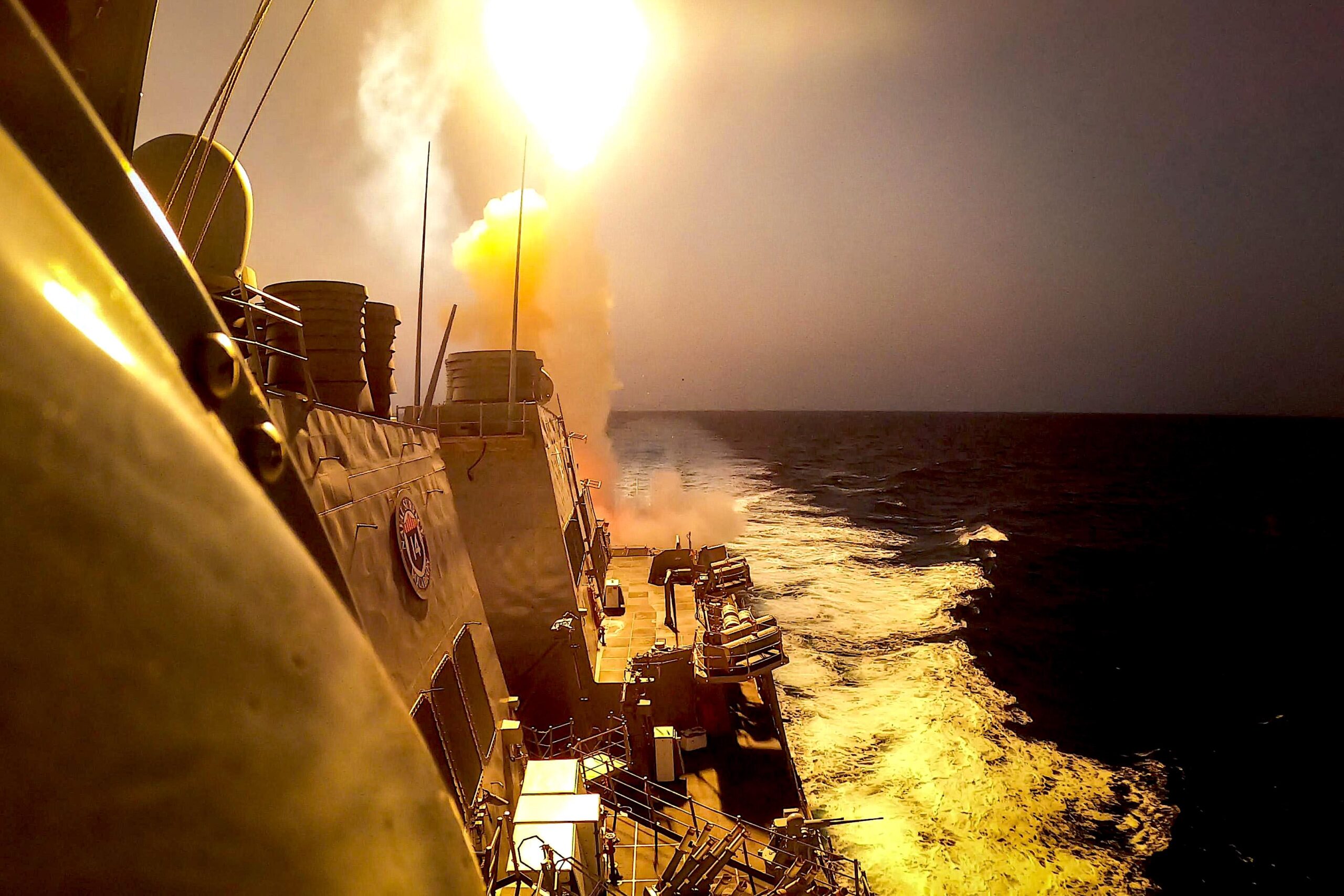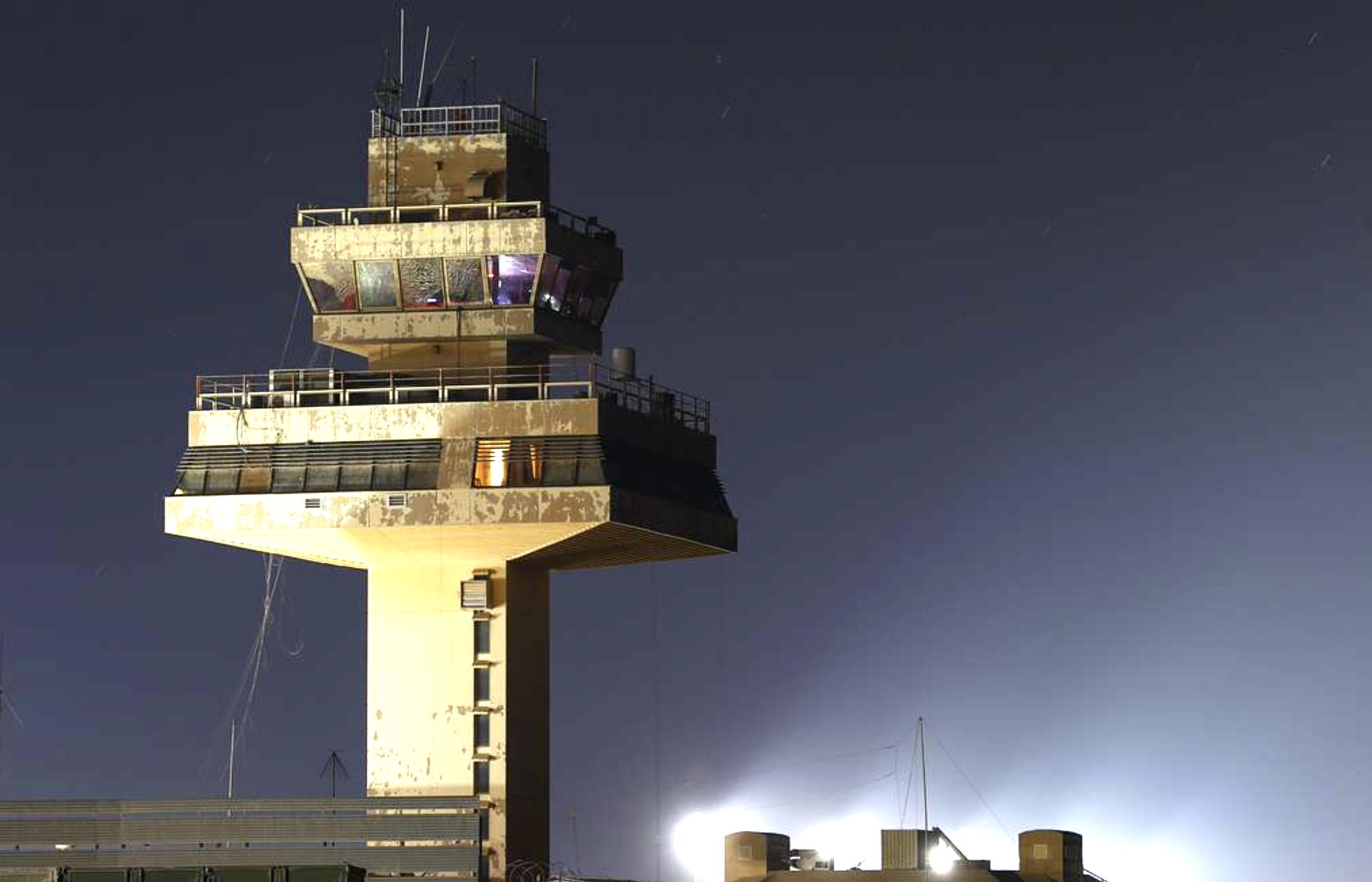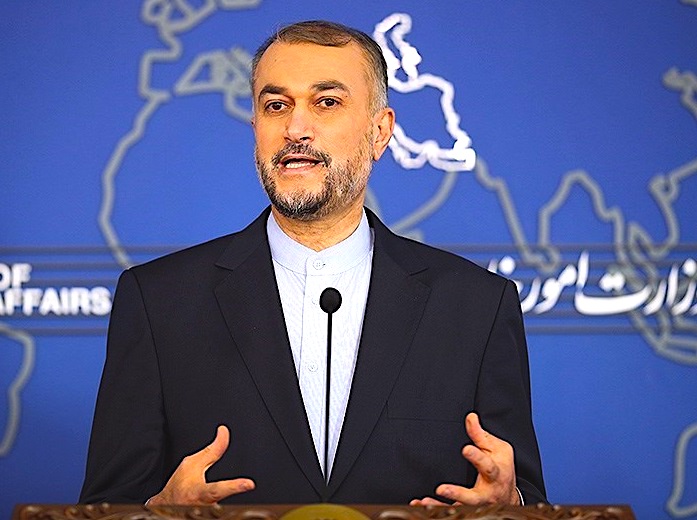From Lebanon to Syria, Yemen, Iraq and Iran, the possibilities of the conflict spreading are enormous, write Medea Benjamin and Nicolas J. S. Davies.

Guided-missile destroyer USS Carney engaging with Houthi missiles and unmanned aerial vehicles in the Red Sea on Oct. 19. (U.S. Navy, Aaron Lau)
By Medea Benjamin and Nicolas J. S. Davies
Common Dreams

 While U.S. Secretary of State Anthony Blinken has been frantically shuttling around the Middle East trying to stop the Israeli conflict in Gaza from exploding into a regional war, the United States has also sent two aircraft carrier strike groups, a Marine Expeditionary Unit, and 1,200 extra troops to the Middle East as a “deterrent.”
While U.S. Secretary of State Anthony Blinken has been frantically shuttling around the Middle East trying to stop the Israeli conflict in Gaza from exploding into a regional war, the United States has also sent two aircraft carrier strike groups, a Marine Expeditionary Unit, and 1,200 extra troops to the Middle East as a “deterrent.”
In plain language, the United States is threatening to attack any forces that come to the defense of the Palestinians from other countries in the region, reassuring Israel that it can keep killing with impunity in Gaza.
But if Israel persists in this genocidal war, U.S. threats may be impotent to prevent others from intervening. From Lebanon to Syria, Yemen, Iraq, and Iran, the possibilities of the conflict spreading are enormous. Even Algeria says it is ready to fight for a free Palestine, based on a unanimous vote in its parliament on Nov. 1.
Middle Eastern governments and their people already see the United States as a party to Israel’s massacre in Gaza. So any direct U.S. military action will be seen as an escalation on the side of Israel and is more likely to provoke further escalation than to deter it.
United States already faces this predicament in Iraq. Despite years of Iraqi demands for the removal of U.S. forces, at least 2,500 U.S. troops remain at Al-Asad Airbase in western Anbar province; Al-Harir Airbase, north of Erbil in Iraqi Kurdistan; and another small base at the airport in Erbil. There are also “several hundred” NATO troops, including Americans, advising Iraqi forces in NATO Mission Iraq (NMI), based near Baghdad.
Years of Low-Grade War in Iraq

Popular Mobilization Forces troops enter Fallujah after the Third Battle of Fallujah with flags of Iraq and the local militia, June 28, 2016. (Tasnim News Agency, Wikimedia Commons, CC BY 4.0)
For many years, U.S. forces in Iraq have been mired in a low-grade war against the Popular Mobilization Forces (PMF) that Iraq formed to fight ISIS, mainly from Shia militias. Despite their links to Iran, the armed groups Kata’ib Hezbollah, Asa’ib Ahl al-Haq and other PMFs have often ignored Iranian calls to de-escalate attacks on U.S. forces.
These Iraqi groups do not respect Iran Quds Force leader General Esmail Qaani as highly as they did General Qasem Soleimani, so Soleimani’s assassination by the United States in 2020 has further reduced Iran’s ability to restrain the militias in Iraq.
After a year-long truce between U.S. and Iraqi forces, the Israeli war on Gaza has triggered a new escalation of this conflict in both Iraq and Syria. Some militias rebranded themselves as the Islamic Resistance in Iraq and began attacking U.S. bases on Oct. 17. After 32 attacks on U.S. bases in Iraq, 34 more in Syria and three U.S. airstrikes in Syria, U.S. forces conducted airstrikes against two Kata’ib Hezbollah bases in Iraq, one in Anbar province and one in Jurf Al-Nasr, south of Baghdad, on Nov. 21, killing at least nine militiamen.
The U.S. airstrikes prompted a furious response from the Iraqi government spokesman Bassam al-Awadi. “We vehemently condemn the attack on Jurf Al-Nasr, executed without the knowledge of government agencies,” al-Awadi said. “This action is a blatant violation of sovereignty and an attempt to destabilize the security situation… The recent incident represents a clear violation of the coalition’s mission to combat Daesh (ISIS) on Iraqi soil. We call on all parties to avoid unilateral actions and to respect Iraq’s sovereignty…”
As the Iraqi government feared, the Islamic Resistance in Iraq responded to the U.S. airstrikes with two attacks on Al-Harir airbase on Nov. 22 and several more on Nov. 23. They attacked Al-Asad airbase with several drones, launched another drone attack on the U.S. base at Erbil airport, and their allies in Syria attacked two U.S. bases across the border in northeastern Syria.

Air traffic control tower at Al Asad Airbase, Iraq, November 2020. (Eric Smith, U.S. Army, Public domain)
Yemen
Short of a cease-fire in Gaza or a full U.S. withdrawal from Iraq and Syria, there is no decisive action the U.S. can take that would put a stop to these attacks. So the level of violence in Iraq and Syria is likely to keep rising as long as the war on Gaza continues.
Another formidable and experienced military force opposing Israel and the United States is the Houthi army in Yemen. On Nov. 14, Abdul-Malek al-Houthi, the leader of the Houthi government in Yemen, asked neighboring countries to open a corridor through their territory for his army to go and fight Israel in Gaza.
The Houthi Deputy Information Secretary Nasreddin Amer told Newsweek that if they had a way to enter Palestine, they would not hesitate to join the fight against Israel. “We have fighters numbering hundreds of thousands who are brave, tough, trained, and experienced in fighting,” Amer said. “They have a very strong belief, and their dream in life is to fight the Zionists and the Americans.”
Transporting hundreds of thousands of Yemeni soldiers to fight in Gaza would be nearly impossible unless Saudi Arabia opened the way. That seems highly unlikely, but Iran or another ally could help to transport a smaller number by air or sea to join the fight.
The Houthis have been waging an asymmetric war against Saudi-led invaders for many years, and they have developed weapons and tactics that they could bring to bear against Israel. Soon after al-Houthi’s statement, Yemeni forces in the Red Sea boarded a ship owned, via shell companies, by Israeli billionaire Abraham Ungar. The ship, which was on its way from Istanbul to India, was detained in a Yemeni port.
?????: ?????? ?????? ?????? ????? ???????-?????? ????? ???? ?? ??? ???
Footage released by Yemen’s Houthi rebel group shows armed men seizing an Israeli-linked cargo ship with 25 crew members in the Red Sea. Read more:… https://t.co/4u2ZpW6ocy pic.twitter.com/F9r6sWTU1h
— Bangladesh News 24 (@bdnews24) November 21, 2023
The Houthis have also launched a series of drones and missiles towards Israel. While many members of Congress try to portray the Houthis as simply puppets of Iran, the Houthis are actually an independent, unpredictable force that other actors in the region cannot control.
Even NATO ally Türkiye is finding it difficult to remain a bystander, given the widespread public support for Palestine. President Recep Tayyip Erdogan of Türkiye was among the first international leaders to speak out strongly against the Israeli war on Gaza, explicitly calling it a massacre and saying that it amounted to genocide.
Turkish civil society groups are spearheading a campaign to send humanitarian aid to Gaza on cargo ships, braving a possible confrontation like the one that occurred in 2010 when the Israelis attacked the Freedom Flotilla, killing 10 people aboard the Mavi Marmara.
On the Lebanese border, Israel and Hezbollah have conducted daily exchanges of fire since Oct. 7, killing 97 combatants and 15 civilians in Lebanon and nine soldiers and three civilians in Israel. Some 46,000 Lebanese civilians and 65,000 Israelis have been displaced from the border area. Israeli Defense Minister Yoav Gallant warned on Nov. 11, “What we’re doing in Gaza, we can also do in Beirut.”

Gallant, left, with U.S. Defense Secretary Lloyd Austin in Tel Aviv on Oct. 13. (DoD, Chad J. McNeeley)
How will Hezbollah react if Israel resumes its brutal massacre in Gaza after the brief pause is over or if Israel expands the massacre to the West Bank, where it has already killed at least 237 more Palestinians since Oct. 7?
In a speech on Nov. 3, Hezbollah leader Hassan Nasrallah held back from declaring a new war on Israel, but warned that “all options are on the table” if Israel does not end its war on Gaza.
[Related: AS’AD AbuKHALIL: Nasrallah & the Future of the War]
As Israel prepared to pause its bombing on Nov. 23, Iranian Foreign Minister Hossein Amir Abdollahian held meetings in Qatar, first with Nasrallah and Lebanese officials, and then with Hamas leader Ismail Haniyeh.
In a statement, Amir-Abdollahian said,
“The continuation of the cease-fire can prevent further expansion of the scope of the war. In the meeting with the leaders of the resistance, I found out that if Israel’s war crimes and genocide continue, a tougher and more complicated scenario of the resistance will be implemented.”

Iran’s Amir-Abdollahian in 2021. (By Tasnim News Agency, Wikimedia Commons, CC BY 4.0)
Amir-Abdollahian already warned on Oct. 16 that, “The leaders of the resistance will not allow the Zionist regime to do whatever it wants in Gaza and then go to other fronts of the resistance.”
In other words, if Iran and its allies believe that Israel really intends to continue its war on Gaza until it has removed Hamas from power, and then to turn its war machine loose on Lebanon or its other neighbors, they would prefer to fight a wider war now, forcing Israel to fight the Palestinians, Hezbollah and their allies at the same time, rather than waiting for Israel to attack them one by one.
Tragically, the White House is not listening. The next day, President Joe Biden continued to back Israel’s vow to resume the destruction of Gaza after its “humanitarian pause,” saying that attempting to eliminate Hamas is “a legitimate objective.”
U.S. unconditional support for Israel and endless supply of weapons have succeeded only in turning Israel into an out-of-control, genocidal, destabilizing force at the heart of a fragile region already shattered and traumatized by decades of U.S. war-making. The result is a country that refuses to recognize its own borders or those of its neighbors, and rejects any and all limits on its territorial ambitions and war crimes.
If Israel’s actions lead to a wider war, the U.S. will find itself with few allies ready to jump into the fray. Even if a regional conflict is avoided, the U.S. support for Israel has already created tremendous damage to the U.S. reputation in the region and beyond, and direct U.S. involvement in the war would leave it more isolated and impotent than its previous misadventures in Vietnam, Afghanistan and Iraq.
The United States can still avoid this fate by insisting on an immediate and permanent cease-fire and the withdrawal of Israeli forces from Gaza. If Israel will not agree to that, the U.S. must back up this position with an immediate suspension of arms deliveries, military aid, Israeli access to U.S. weapons stockpiles in Israel and diplomatic support for Israel’s war on Palestine.
The priority of U.S. officials must be to stop Israel’s massacre, avoid a regional war, and get out of the way so that other nations can help negotiate a real solution to the occupation of Palestine.
Medea Benjamin is co-founder of Global Exchange and CODEPINK: Women for Peace. She is the co-author, with Nicolas J.S. Davies, of War in Ukraine: Making Sense of a Senseless Conflict, available from OR Books in November 2022. Other books include, Inside Iran: The Real History and Politics of the Islamic Republic of Iran (2018); Kingdom of the Unjust: Behind the U.S.-Saudi Connection (2016); Drone Warfare: Killing by Remote Control (2013); Don’t Be Afraid Gringo: A Honduran Woman Speaks from the Heart (1989), and with Jodie Evans, Stop the Next War Now (2005).
Nicolas J. S. Davies is an independent journalist and a researcher with CODEPINK. He is the co-author, with Medea Benjamin, of War in Ukraine: Making Sense of a Senseless Conflict, available from OR Books and the author of Blood On Our Hands: the American Invasion and Destruction of Iraq.
This article is from Common Dreams.
The views expressed are solely those of the author and may or may not reflect those of Consortium News.

I am not sure what will happen—– the future looks dark for Palestinians. But then, maybe many in the Middle East will attack Tel Aviv. This will either bring the US and Biden into more war, or the US will get whacked so badly that Israel will be on its own.Maybe a NAKBA back AT YA will come into play and there will be 2 losers, Israel and America.
I am just gobsmacked that Israel seems to feel that no laws can contain it—- lions, tigers and bears–oh my
I fear for the people of Israel that support peace.
Years ago I wrote a book concerning the potential danger of our sun to earthlings–particularly concerning electronics. Now, I monitor the daily activity of the sun (via suspiciousobservers). This is pure science:
Since 1851, the magnetic field of our planet has been decreasing–particularly in the last 20 years. The magnetic field protects us from “radiation.” Lately, any little flare activity is felt with unusual fervor. We are breaking records that way. Yesterday, we received the impact of two flares: a little C-class, and a moderate M-class flare. Auroras were observed far to the south, in New Mexico, and a few minor electronic failures occurred world-wide. When a powerful X-class flare occurs it should get more interesting. WHEN we get an event like the 1859 Carrington event, or even the 1879 or 1921 events, total electronic failure could occur in regions, or worldwide.
Total–as in dead. No phone, internet, cars, planes etc.
I would not want to be in Israel when that happens. An AK-47 does not require electronics to function, and the residual anger of the ‘Arabs’ in surrounding countries is understandable. I’d get out of there.
It seems clear that the reckless abandon that is US foreign policy will continue unabated. The fealty of the US political class to Israel seems beyond reproach, and with that fact what chance is there of this coming to an end anytime soon? I’m sure the military is already prepped for an escalation through out the region. In light of this 2023 has to be the most farcical holiday season in recent times. I can’t even eat without feeling guilty because of the actions of the government, in the face of what’s going on out there. How can anyone celebrate anything? Sure, be grateful that it’s not you being bombed to smithereens, but that’s little comfort. One day it just may be us, and only then will the part of the population that still has their heads up their butts snap out of their entitled complacency. Maybe not even then.
Hear rational truth being spoken, against the grain of audacious, bigotry, deceit, fabrication, and outright lies:
For an alternative perspective and report on the actual conditions within, and from inside Israel, recorded on Nov. 28th, please view the interview (48mins.) with suspended Member (for 45 days) of Israeli Parliament, Jewish Knesset Member, Dr. Ofir Cassif, Professor of Political Philosophy, interviewed by Swiss Professor of International and Neutrality studies, Dr. Pascal Lottaz,
hxxps://www.youtube.com/watch?v=lzX_sYAoNDM
No empire lives forever. Like all living things, empires are born and empires die. Over time, the life expectancy of empires has been drastically reduced, possibly due to advancing technology which simply makes things go faster and faster. The Egyptian empire lasted over 3000 years. The Babylonian empire lasted about 1500 years. The Roman empire lasted about 1200 years. The Persian empire lasted about 1200 years. The Athenian empire lasted about 800 years. The Ottoman empire lasted about 600 years. The Russian empire lasted about 400 years. The British empire lasted about 300 years. The U.S. empire is now approaching its 250th birthday. How much longer will it last?
The root causes of empire decline are 1) political corruption, 2) internal conflict, 3) military adventurism and over extension of its reach and 4) overconfidence, arrogance and hubris.
I am not sure I really believe this. It really looks like the Gazans have been abandoned by the Muslim world. No mention of the oil weapon , the Abraham Accords have not been suspended. The Houthis? Not realistic at all. Algeria ? Just posturing.
And yet, it is already too late. What will the future look like if genocidal warfare is allowed to be normalized? What arguments will be used to support such actions in the future? We are looking at the end of the West’s power to do anything other than flounder aimlessly in micro-aggressions until all its forces are spent. You can’t declare war against everyone without having war declared by everyone against yourself. And when the US finally suspends its support for Israeli actions, it will creep back into isolationism and shine its darkest light against its own citizens, blaming them for its own, feckless adventures. The energy is shifting back to the Island of the World, which is Eurasia, the population center for most of humanity throughout history. We are returning to our roots in Africa and the Middle East, China, Russia and Europe, that we might settle the score with our origins and face once more the memories of our original diaspora, including those lessons we failed to learn in its wake. All animals on earth return home in their twilight. The West was just the last, needless expression of wonder at the riches it soon would squander. The US is tangential at best to any history going forward. Or else it may become the monster turning history into a holocaust of misplaced meanings. We still have a choice. We might even redeem ourselves, but it is looking more and more unlikely.
The US and its little rottweiler have a little more time to remain and consolidate their position in the middle east, but of course their fate will ultimately be sealed. This has been fate of all empires according to the British soldier intellectual John Bagot Glubb. Moreover, do the fate of Arminus and Teutoburg Forest ring any bells? It is just a matter of time really of pox in their guts. Make it soon you chaps, time is on your side.
Don’t hold your breath for any sign of sanity in Washington. They have been stuck on stupid for so long, they believe their foreign policy in all cases is unimpeachable. We are going to have to force the issue through mass civil disobedience until business as usual becomes impossible.
We vehemently condemn the attack on Jurf Al-Nasr, executed without the knowledge of government agencies,” al-Awadi said. “This action is a blatant violation of sovereignty and an attempt to destabilize the security situation…
The Iraqi Parliament have voted a number of times for the US to leave and Washington has ignored them everytime. They are still occupied.
If Israel resumes its Genocide in Gaza and to a lesser extent the West Bank, I question if any middle eastern leader can hold its populations back from defending Palestine and remain in power. In fact, I would go so far to say that, unless Israel plays really, really nice and agrees to return to its 1967 border, Israel won’t exist in 6 months. 1.5 BILLION Muslims is a lot, and they are all on the same side in this case.
“… The priority of U.S. officials must be to stop Israel’s massacre, avoid a regional war, and get out of the way…”
Won’t happen. There’s money in war.